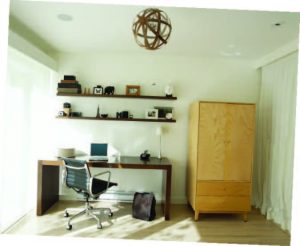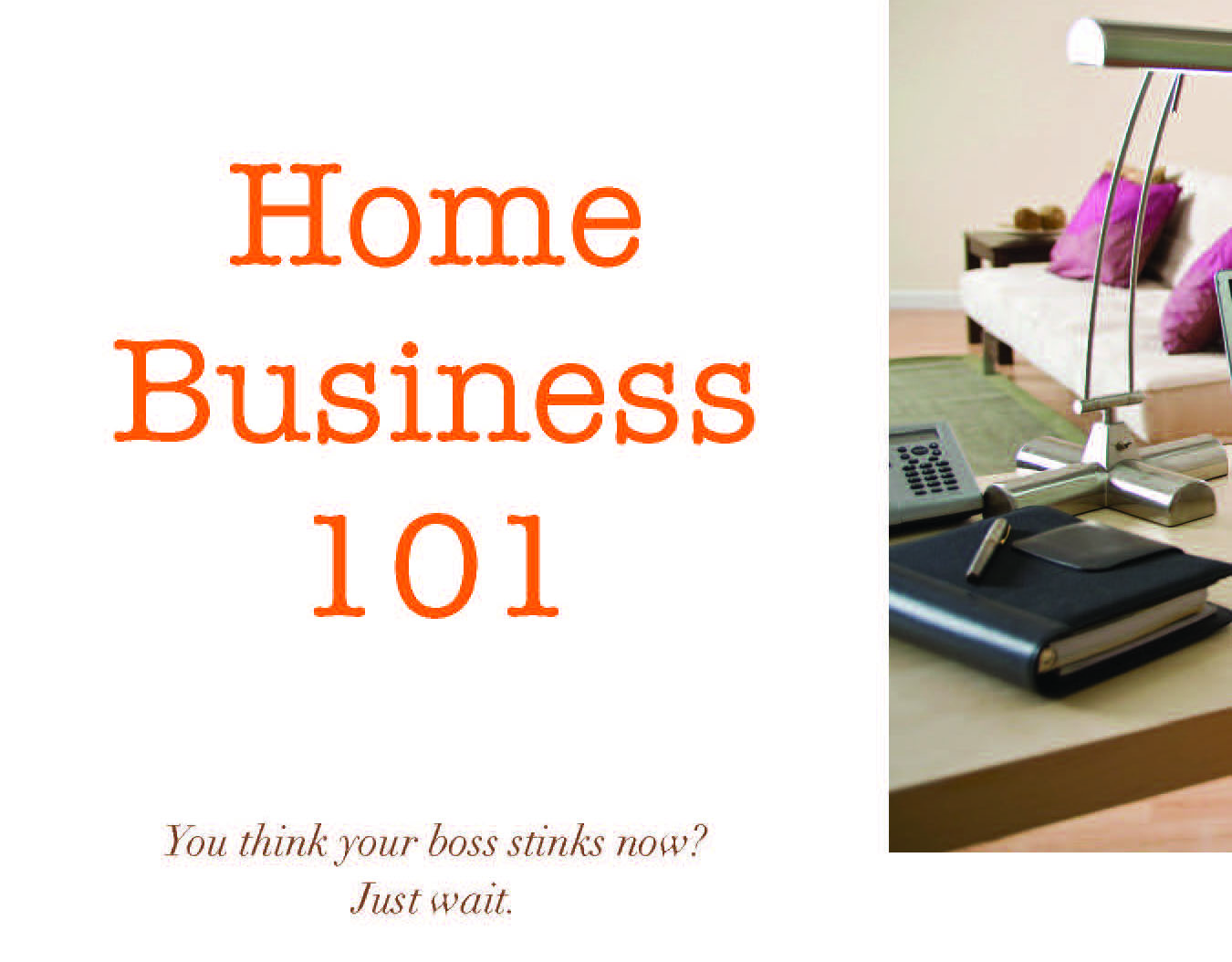You think your boss stinks now? Just wait.
By Mark Stewart

Photo Credit: iStockphoto/Thinkstock
One in 75 home businesses will generate $1 million or more in 2013. The likelihood of a home business showing a profit over a 3-to-5 year period is double that of a traditional brick- and-mortar business. A recent poll of working-age Americans showed that roughly 7 in 10 would prefer to be self-employed. It seems like a no-brainer, right? Well, all I can say is be careful what you wish for.
As someone who has worked primarily out of a home office full-time for two decades, I have come to a couple of important conclusions. First, I am forever doomed to be one of the 74 people who isn’t bringing in a million a year. Second, I do know what I’m doing. I am successful in my field (publishing), my mortgage gets paid on time, the cupboards are full and I can’t recall the last time I had “nothing to do.” When my spouse or children invite guests over, they do not try to hide me, even unshaven, on my worst hair day. I guess the fact that I still have a wife and kids should count for something, too. I almost never get sick because my human contact is limited. And I don’t have a huge number of friends, probably for the same reason.

Photo Credit: iStockphoto/Thinkstock
It’s a life I thoroughly enjoy…however, not one I recommend to just anyone.
Invariably and somewhat regularly, I am asked by friends, acquaintances, business contacts and just random people for advice on starting or managing a home-based business. I may not be the brightest business person (my accountant is constantly reminding me of this) but as far as these folks are concerned, I have acquired enough experience to be of some use to them. Consequently, I feel comfortable answering questions, sharing anecdotes and insights, and encouraging them to be honest and introspective about whether they truly are cut out to work from home.
Over the years, I have developed a very personal and totally unscientific list of Do’s and Don’t’s for people considering a home-based business. Some are common sense, while others are the result of trial, error, experience, and additional error. So without further adieu, I present the full-time home-based business Gospel According to Me:
HABIT FORMING
• Wake up each day with a battle plan. No, make that Wake up each day prepared to go to war. This is the single greatest piece of advice I can offer, so why save it until last? The world owes you nothing; your home business is not guaranteed to survive. To succeed, you need to look back at the end of each day and be able to say, “I did everything I possibly could today to move my business forward.” It starts with an attitude, and includes intense focus, self-examination and discipline. It means making lists and crossing things off. It means using your time intelligently. It means not getting careless and shooting yourself in the foot. Like a soldier, you wake up every day prepared to go over the top and enter enemy territory. And like a soldier, when the sun goes down, you’re happy if you’ve gained a little ground and have lived to fight another day.
• If you wake up, get up. When you run a home-based-business, there is no official start to the workday. If you are able to sleep to 9:30, kudos to you. But if your eyes are wide open at 6:30 and you’re already thinking of new ideas, get out of bed and ease into the day.
• Dress before 10:00 a.m. It’s fine to start the day in your underwear, but at some point you will pass in front of a mirror and realize you look like a hobo. Getting dressed is a way of telling yourself it’s time to get serious.
• Make lists. Make a new list each morning, prioritize the items that absolutely must be accomplished that day, and cross them off as quickly as you can. The feeling of accomplishment comes when you start crossing off things below the must-do’s. As you think of new items, add them. If new tasks or opportunities arise during the day, add them, too. Even if you don’t get to them, they will be there in writing for you when you make your new list tomorrow.
• Shower or bathe at the end of each working day. Your significant other, offspring and pets will love you for it. More important, it helps wash away the working part of your day. It can happen at 4:30 or 7:00 or midnight—just don’t be tempted back to work after you’ve toweled off.
• Learn how to power down. This is the second-most important piece of advice I can offer. A high percentage of the people I know who failed to make a go of a home business (this includes a lot of freelance writers and editors) tell me that the thing they simply could not do was shut their brain off at night. When you work in a traditional place of business, you leave it physically and return home. Yes, some people take their jobs home with them, but there is a physical separation that gives them an opportunity to recharge and be mentally ready for the coming day. When your business is in your home, it’s harder to empty your head before it hits the pillow. If you toss and turn worrying about a client who owes you money, or whether an important phone call went well, or how you can tweak your social media presence, then you will crash into a wall the next day, accomplish less than you want, and toss and turn even more the next night. And there is only so much Ambien you can take.

Photo Credit: iStockphoto/Thinkstock
THE WORKSPACE
• Set up a clearly defined work area. It doesn’t have to be sealed off from the rest of the house, and it doesn’t have to be immaculate. But it must be a legitimate workspace. It tells you and everyone else that you are serious about getting things done when you are sitting or standing there.
• Set up a clearly defined storage area. You need a place to put things that are important to your business, but which you don’t need to access every day. Invest the time required to organize, label, alphabetize—whatever it takes so you don’t waste time retrieving these items.
• Establish boundaries. As the operator of a home-based business, accept the fact that you will never achieve church-and-state balance between home and business. There will always be spillover, especial if another family member is involved in your company. Nevertheless, explain openly and clearly to those who share your domicile that your home sometimes must adhere to basic rules of business, and that no one should take it personally if they feel ignored or underappreciated in some way. Also, your business workspace must be respected; it is not for them to use or disturb.
• Clear your line of sight. When you chose a primary workspace—the place where your attention cannot wander—remove family photos and other items that will tempt you to daydream or lose focus. You should never have a window directly in front of you, even if there is a computer screen between you and the window. It’s okay to keep these things near to you, just not right in front of you. By the way, having a clutter • Sound off. You do not need a soundtrack for your life. Eliminate any noise that distracts you, breaks your concentration, or diminishes your ability to be productive. Recognize that your iPod, stereo, radio and television could be your worst enemies. Silence is literally golden. If you are working hard, you won’t notice the lack of music or news chatter. I feel the same should be true of the noises that alert you to new emails, texts, tweets or Facebook entries. They create too many temptations. Keep your phone ringer on, that’s it.
• Choose a comfortable chair. A desk chair is like a pair of shoes. It’s worth spending a little time and money to find the right fit. Many a carpal tunnel case began with the wrong desk chair. The puffy leather reclining model at Staples may look good and feel great, but that doesn’t mean it’s the one you want. Start out with something that’s already around the house until you develop a sense of which features might enhance the way you interact with your workspace. In my case, I sit in a wooden armchair. Wheels and padding didn’t work for me. To each his own.
• Backup everything. Invest $100 in a computer backup device and learn how to use it properly. If a database is compromised or you lose a month’s worth of emails, the impact could cripple your business. I speak from experience.
• Get your phone situation straightened out. Designate at least one line and one physical phone to your business. If that phone rings, it’s business. If another phone rings, it’s not. You cannot imagine how this will reduce the anxiety and stress level in your home. If you have landlines, this is especially important. But even if you are an all-cell household, it enables you to “close your business” and devote yourself to family and personal matters when you need to.
• Don’t use the phone for business when the little ones are around. A business professional does noted workspace is no crime. Some people simply function better that way.
interact with others while toddlers are screaming in the background. The same goes for babies, teenagers, significant others, dogs and birds. Plan your phone time for when you have quiet time.

Photo Credit: iStockphoto/Thinkstock
BODY & SOUL
• Obtain insurance. Boring but important. If you do not have insurance coverage through another job or through a spouse, make this a priority. The peace of mind alone is worth it. Sadly, the cost of a half-decent health insurance plan in New Jersey for a small, independent home business is absolutely vulgar—$300 to $500 a week for a family of four. I am not a religious person, but in my 20 years of paying usurious, ever-escalating premiums, I have developed a belief system based on the idea that everyone in the health insurance industry will find themselves at the bottom of a fiery hole after they die. If I find out otherwise, I will be really disappointed. Did I mention that I’m not fond of health insurance companies?
• Watch what you eat. And how you eat. I have gone 10 hours without eating or drinking anything because I was so absorbed in my work. Other times I have consumed five full meals in a day out of sheer boredom. It’s a good idea to have a general plan when it comes to breakfast, lunch and dinner. That has helped me stay within 10 pounds or so—up or down—of the same weight for the past 20 years. If you tend toward unconscious or binge eating, recognize that your new workplace is attached to a kitchen, and that no one is there to watch in horror as you down a tub of ice cream at 11 in the morning. Self-control, please!
• Get regular exercise. This has always been a challenge for me. I don’t swim unless I’m drowning and I don’t run unless an animal is chasing me. I don’t like sports without a score and I have purchased at least three gym memberships in my life without ever actually having set foot in a gym. My solution was to set up an office in the attic of our house, and to take any opportunity I could think of to go to the basement or first floor, and then back up again. On an average day I’ll bet I go up and down 300 steps. My legs are like hardened steel (my belly is more molten). I have never had to blow $1,000 on a stairclimber. I am in pretty decent shape. That being said, I know someone who was so consciencious about regular exercise that she could not begin her day until she had completed the ritual of hitting the gym, showering, and eating a low-calorie breakfast. This was an admirable routine, except for one thing: These were her most alert and productive hours of the day. At 3:30 she was out of gas and worthless for anything other than menial tasks. Use your best judgment here.
• Don’t drink. There are many ways to reward yourself, and many ways to decompress. None of these ways should involve alcohol. At least one person I know has lost a business (and more) because he started drinking alone when he should have been working. I strongly suspect a couple of others I know stumbled down the same path. Once you are done for the day, cheers, go for it. It’s your life and it’s a free country. Yes, we all know Hemingway did his best work with a bottle next to the typewriter, but his own story didn’t end very well, did it?
TIME MANAGEMENT
• Stay off the Internet. It’s a tool. Use it intelligently. If you are not pursuing a goal relevant to your home business, leave the Overstock.com browsing, eBay bidding, eNews-reading, Facebooking and other stuff we won’t mention until you have officially called it quits for the day.
• Identify your most productive hours. On a good day, the human brain probably can muster about six hours of optimum performance. And like any other business, a home-based business can really wear you out. So do yourself a huge favor and recognize the times of day when you are “locked-in” and then plan your schedule accordingly. My mental engine starts firing on all cylinders around 10:30 in the morning and keeps going until 3:30 or so. Then sometime after 6:00 or 7:00 I get a second wind and can work right into the night. The key for me is to assign myself the most important tasks at those optimum hours, and to have dumb-dumb work to do before and in between. What’s dumb-dumb work? Putting things back where they belong. Doing basic research on the Internet. Compiling information on the marketplace or checking out the competition. Going to the post office or the bank.
• Make personal business into breaks. Everyone needs to take short breaks during the day. Avoid falling into the trap of turning on the TV or surfing the web aimlessly. You will lose too much valuable time. Instead, devote 10 or 15 minutes to taking care of personal business—throw a load in the wash, tighten the hinge on that cabinet, take out the garbage, floss.
• Use downtime to plan ahead. When you’re not busy, or you’re tired, or you just need to switch gears, use these moments to broaden the foundation of your home-based business. If you have made a business plan, it should include where you’d like to be in 6 months or a year or 18 months—along with the steps needed to get you there. Downtime is the right time to chip away at the tasks required to move you closer to your goals. This has been incredibly important to my business. There’s nothing worse than finishing one job and going, “Um, what do I do next?” I know what I’ll be doing two years from now—which is rare in my business. Trust me, it didn’t happen overnight!

Photo Credit: iStockphoto/Thinkstock
Home Business by the Numbers
There are more than 15 million home-based businesses in the U.S., and more than 10 percent of American homes are used in some way as a place of business. Women appear to make up a majority of the home-business “workforce.” Start-up costs for most home-based businesses are under $10,000. Many begin with less than $1,000. Some start with the shirt on their backs. Although much of the income generated by home businesses goes unreported, estimates of the amount of money made by people working from home are typically upwards of $400 billion a year. Fewer than 5% of successful home businesses leave the home and move into office or retail space.
Home Office Feng Shui
The Feng Shui of a home office is practical and should mimic that of most business offices. The office should set the scene for your transformation from relaxed resident to reliable and focused professional. When you walk in, you should feel as though you are entering a different world, so that your mind shifts from home-related matters to help you concentrate on work. Here are some Feng Shui do’s and don’t’s to create a positive work environment in your home office:
Do…
create a “professional” décor. Hang positive business mementoes on walls, in full view, to reinforce your identity as a successful and skilled worker.
Don’t…
have the room double as a multiuse venue, or it will be difficult to seriously concentrate on your work.
Do…
set up your desk so that all intruders—big or small, human or animal—can be seen, and thus you won’t be startled and distracted from your tasks. Similarly, the computer should sit so the user can easily see the door or room divider.
Don’t….
underestimate the value of bright lighting.

Photo Credit: iStockphoto/Thinkstock
Do…
hang a mirror so that you can see the view from your home-office window.
Don’t…
go overboard on organization. Yes, feng shui tenets stress the wisdom of a clean, efficient office, but this writer ascribes to the sage words: “Out of chaos, comes creativity.”
—Sarah Rossbach, author of Feng Shui: The Chinese Art of Placement and Interior Design with Feng Shui.
Editor’s Note: Mark Stewart has managed the EDGE editorial team since 2009. He also writes books for the school and library market, and runs a successful sports web site. He wrote this article in his wooden desk chair, at a computer set up against a wall with a blue abstract painting, surrounded by clutter, with no music playing.





